| Reviews & Columns |
|
Reviews DVD TV on DVD Blu-ray 4K UHD International DVDs In Theaters Reviews by Studio Video Games Features Collector Series DVDs Easter Egg Database Interviews DVD Talk Radio Feature Articles Columns Anime Talk DVD Savant Horror DVDs The M.O.D. Squad Art House HD Talk Silent DVD
|
DVD Talk Forum |
|
|
| Resources |
|
DVD Price Search Customer Service #'s RCE Info Links |
|
Columns
|
|
|
Love and Honor
FUNimation // PG-13 // November 11, 2008
List Price: $24.98 [Buy now and save at Amazon]
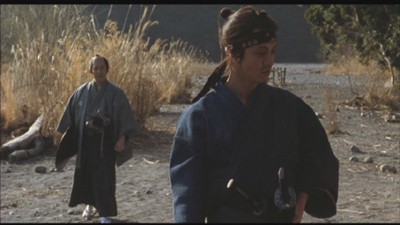
The Film:
Yoji Yamada's trilogy is a testament to the dramatic potency of samurai films, even when they're stripped bare of their signature whirlwind sword duels. This director accomplishes similar strengths in both his grand masterworks Twilight Samurai (Tasogare Seibei) and The Hidden Blade, but not to such a unique degree than Love and Honor (Bushi no Ichibun). Though his previous two films hold more dramatic clout, his third entry blindsides its audience with an absorbing hero intertwined within a supreme blend of compelling harshness and relieving humor. Love and Honor ultimately taps into these enjoyable resources and builds an overall gentle message of maintaining and regaining honorable dignity through life's treacherous hardships.
It follows suit with the rest of Yoji Yamada's samurai drama trilogy with a familiar story rhythm. Both of his other entries into the "mythos" gracefully build interest throughout their core in portraying and down-and-out samurai attempting to pull up from a lowered caste, all with a fascinating periodic pulse with sparse swordplay and bleak theatrics. His conclusive bookend to the series is no different; Shinnojo (Takuya Kimura, 2046) has wedged himself into a somewhat unimpressive position as a food taster / filter for his lord, a position that demands that he sit with four other individuals in a separate corridor and determines that "no ill effects" come from eating each designated dish. It's a post that creates daily tension, whether the tasters address it or not, which leads to Shinnojo returning home to his beautiful wife Kayo with bitterness and strain. One of these nights, he begins to show ambition towards an alternate profession -- assembling a samurai dojo that specializes in teaching younger individuals in a way that compliments individual fighting styles -- but his desire would arise at an inopportune time. When the demands of his job finally catch up to him and a poisonous dish claims his eyesight, he must struggle to deal with the frailly of life's unfairness amid service and embrace the definition of honor in times of familial crisis.
Though he accomplishes the same sort of departure from more traditional theatrics and acting techniques in his previous films, Yoji Yamada really steps outside of the box with his characters in a very animated style through Love and Honor. Instead of more subdued, potentially more realistic portrayals, each character acts with extensive levels of brimming theatrics. When you compare the character direction with the likes of samurai auteurs Kenji Mizoguchi and Akira Kurosawa to that in Love and Honor, all of Yoji Yamda's characters feel pleasantly melodramatic. There are some similarities the film exhibits to Kurosawa's character demeanors in their capacity for humor and emblazoned fervor, but not to the full-blown extent presented here. Shinnojo, played by hybrid musician-actor Takuya Kimura, impresses as a highly amiable and respectable hero with little to no unattractive qualities, other than the slightly degrading statements he throws at Kayo early in the film. He's a conflicted, confident samurai who struggles with his position in the royal infrastructure because of his own eternal struggles with honor.
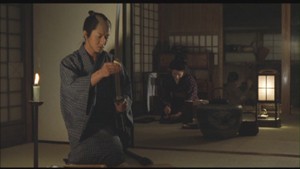
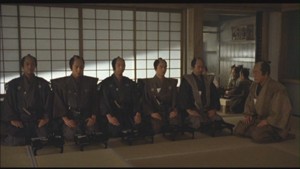
This inner fight becomes one of the key influences on Love and Honor's satisfying demeanor, especially after the requirements of this lowly position end up haphazardly claiming his eyesight. Once this happens, his internal struggle becomes exceedingly intriguing. At the start, we see this assumedly solid swordfighter doing nothing but sacrificing his life day in, day out for the good of the royalty's food consumption; after he consumes that poisonous dish, Shinnojo is put in a position where he's forced to fight to recapture the rewards of this meager life. Alternately, he must wrestle with the nobly-minded unfaithfulness that his wife falls into out of desperation, one that she assured would never occur. Shinnojo is captured in a circle of despair, one which surrounds him after the already feeble supportive structure of respect and dignity crumbles underneath his feet.
Instead of making this story of dishonesty and sacrifice as dreary as possible, Yoji Yamada keeps audience concentration and interest paramount during his direction of Love and Honor through a fluid blend of drama and lightheartedness. He integrates comedic flutters without sacrificing the strength of the material, namely the grating conflict between Shinnojo and Kayo. Strategically placed throughout the film, his support characters add that little extra kick to the film that shifts the viewer's moods. Instead of the dull procession of the lord's food being nothing more than the five samurai sampling his dishes, that scene also includes a few entertaining lines from the other testers about the food they are tasting. Yoji Yamada includes important bits of information, namely the food that Shinnojo and company are eating and the feasibility of how the food tasting in another location could go awry, in a joined effort that keeps the audience entertained.
Under less skilled direction, this blend could demerit the film's capacity to move its viewers. Even with this risky step, though, Love and Honor doesn't stop there; it also includes slapstick humor, mainly in Shinnojo's nephew with his crazy flailing stick, the watchful aunt who will not cease her gossipy chatter, and the wonderfully colorful assistant, Tokuhei, played by Tora-San regular Takashi Sasano. Even the poised Shinnojo blindly runs into a bamboo water handle and laughs, which becomes a strong tension alleviator. All these elements are gathered together and skillfully packed into Love and Honor's heartfelt parable of life and love's survival during tragedy. These comedic sparks not only keep Yoji Yamada's audience interested in the deliberate, meaningful story without draining their emotional capacity, but they also make his film even more complete.
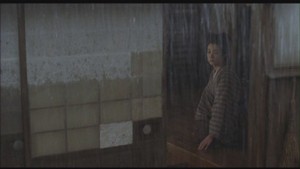
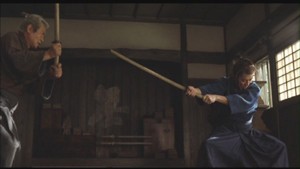
But Love and Honor doesn't back down from its message of perseverance through strife and hardship, even when it methodically tries to invoke entertainment. It's a simple concept: staying strong and pushing forward will reap its rewards afterwards. There's much more lying underneath, though, especially within Shinnojo's strife to accept Kayo and her actions. In essence, the key message in Love and Honor is that honor can wear many masks; it can be flamboyant in the form of a samurai's charismatic dignity, but it can also be severely degrading when taking the form of the sacrifices Kayo makes for the welfare of her family. However, Yamada's film is also a critique on honor as a system and its domino effect once something goes awry. It leads the viewer to think about what the fabric of this meaningful arrangement of strength and belief is really made of, and how fragile or important it really can be. Shinnojo embraces more of the true essence of samurai and its honorable connotations near the end -- even, and especially, as a blind man.
Love and Honor ends with a much more resolute tone than the other films in Yamada's trilogy, striking a strong tone of perseverance, understanding, and ultimately the pure and humane essence of honor. He embraces similar acceptance in his other films, but they don't integrate as seamlessly into their conclusions the way this film does. The strongest message lying within Love and Honor lies in the stark differences between public honor and private, or internal, honor. Yoji Yamada has no problems holding the two against each other for comparison, critiquing and preserving the nature of this resolute quest for dignity and recognition. This balance between societal and personal honor is a theme still explored amongst countless narratives today, and will be addressed for centuries to come with much the same honesty as Love and Honor.
The DVD:

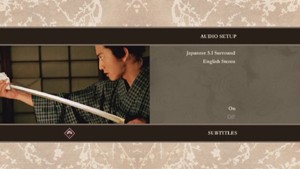
Love and Honor, in another strong turn from FUNimation in live-action DVD follwing successes such as Shinobi: Heart Under Blade, comes packaged in a standard single-disc keepcase presentation with gorgeous artwork that replicates some of the marketing materials from its theatrical run. Oddly, though it differs from the layout on the cover posted on Amazon and the like, the front cover and spine of this DVD did not have the English title "Love and Honor" printed on them. It does appear on the back cover -- as well as on the beautifully designed discart. What does appear is the Japanese hiragana / kanji for its native title. To be honest, the lack of English title on the front adds a lot of "happy accident" class to the artwork.
The Video:
Yoji Yamada's samurai films have had a troubling past for Region One releases: first, Twilight Samurai still hasn't received a proper anamorphic treatment here, requiring others to import higher-quality copies from Japan and China to watch the film in a respectable fashion. Hidden Blade fairs better, though it came from Tartan with a somewhat grimy, blurry image. Love and Honor, however, closes out the trilogy with a splendid anamorphic widescreen image, preserving the 1.85:1 image (closer to 1.83 or so in exact measurement) for its theatrical distribution that's more than likely sourced from Shochiku's transfer. It's a more colorful film than the others, leaning a lot on blues, tans and browns for its mood.
Yoji Yamada uses similar color palettes for all three of his films, blending plenty of down-to-earth nature cinematography with a framing style that both mirrors Ozu-like concepts in linear construction and deviates completely from them -- such as the scene where each of the sliding doors are opened and all three members of the household can be seen in individual rooms. The image holds an impressive level of color solidity, as well as plenty of competence in sharpness and detail. It can get mildly blurry and noisy in a few spots, but that comes counterbalanced with scene sporting splendid focus. Black levels suffer a bit, though, sometimes seeming rather grayish and a bit noisy at most points. Maybe it's just because I'm used to the other local treatments, but this visual transfer for Love and Honor really hit the nail on the head pretty hard for this beautiful film.
The Audio:
As with similar visual style, Love and Honor also carries a dialogue-drive, ambient soundtrack that only marginally benefits from having surround channels. That soundstage comes preserved in a front-heavy Japanese Dolby Digital 5.1 presentation, one that only stretches to the back when absolutely necessary. This is pretty infrequent, seeing as how much of the film balances on rigid drama and brooding verbal externalization. However, rustling trees, a few crowd effects, and a few other domestic effects manage to trickle to the rears in very scant degrees. The big players here are the hauntingly beautiful score and the verbal strength, both of which sounded superb. An English Stereo track is also available, but only high-quality English subs -- ones that show only extremely minimal grammatical and verbal gaffs -- are available.
The Extras:
Sadly, Love and Honor doesn't even come with a Trailer for the film itself -- only a line-up of Coming Attractions for other FUNimation products.
-----
Final Thoughts:
Love and Honor might not be the best in Yoji Yamda's toted trilogy of samurai dramas, but it probably contains the most novel, intriguing concept out of the three -- which makes it all the more unique. Takuya Kimura delivers a bang-up performance, embodying the lead in a muddled hero / anti-hero fashion that grabs attention from the start and doesn't let go until that signature spark of samurai intensity at the climax. Because of its novel concentration of etching out well-defined characters and its additional infusion of humor, it separates from the other entries into a beautiful, pleasant display of desperation and endurance. Though I do wish that FUNimation had included at least a handful of special features -- even a trailer -- the quality of the film and the solidity of its technical standards make this a Highly Recommended disc. If Yoji Yamada's other samurai stories, Twilight Samurai and Hidden Blade haven't left a lasting impression, then this probably won't sway that sentiment; however, those familiar with them will find a pleasant shift in direction and essence with this wonderful close to a great trio of films.
|
| Popular Reviews |
| Sponsored Links |
|
|
| Sponsored Links |
|
|
| Release List | Reviews | Shop | Newsletter | Forum | DVD Giveaways | Blu-Ray | Advertise |
|
Copyright 2024 DVDTalk.com All Rights Reserved. Legal Info, Privacy Policy, Terms of Use,
Manage Preferences,
Your Privacy Choices | |||||||













